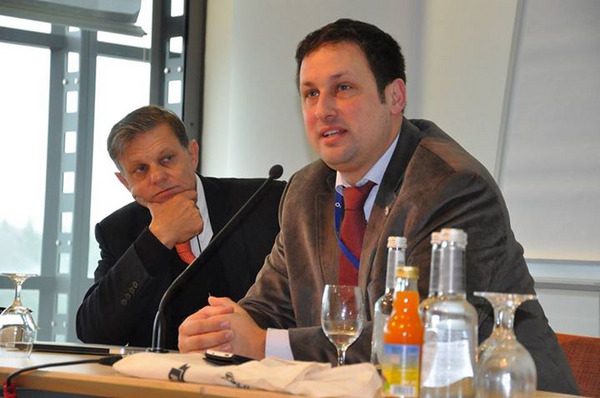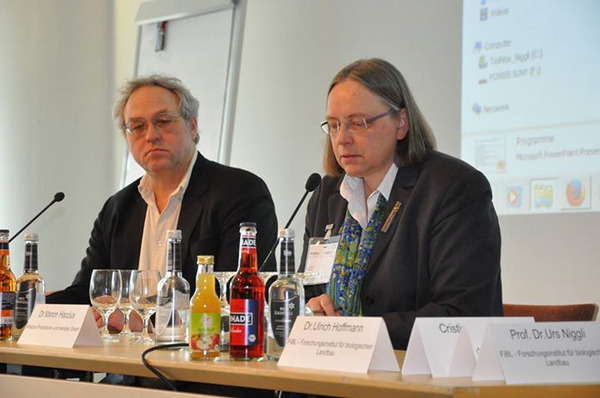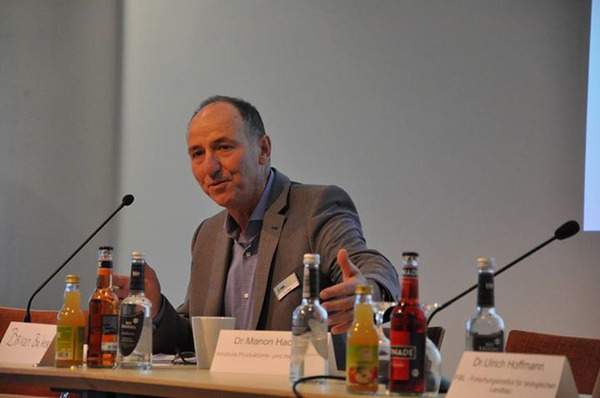Science Day was opened by Andre Leu (http://orgprints.org/28391) , the president of the International Federation of Organic Agriculture Movements (IFOAM - Organics International) and Marco Schlüter, the director of the European Union Group of the International Federation of Organic Agriculture Movements (IFOAM EU).
The new Strategic Research and Innovation Agenda of TP Organics
During the morning session, TP Organics presented its newly published “Strategic Research and Innovation Agenda”. This document describes the research and innovation priorities of the European organic sector until 2020. Solving these challenges will be crucial to drive the development of the sector and strengthen its competitiveness. The new Strategic Research and Innovation Agenda will be used to influence funding priorities of EU and national research programmes.
Bram Moeskops (TP Organics) introduced the new strategy, while Cristina Micheloni (TP Organics and Italian Association for Organic Agriculture AIAB) presented the main research and innovation challenges in organic production.
After the launch of the Strategic Research and Innovation Agenda, Hans-Jörg Lutzeyer (Directorate-General Research and Innovation) and Alina Ujupan (Directorate-General Agriculture and Rural Development) from the European Commission and Borris Haupt from the Enterprise Europe Network gave an overview of the instruments available in Horizon 2020 and Rural Development to fund research in the organic sector. Special attention was paid to funding opportunities for Small and Medium-sized enterprises (SMEs). For more details see separate news item.
TIPI’s Vision and Strategy for Organic Farming Research
The session was opened by Urs Niggli (TIPI president and director of the Research Institute of Organic Agriculture FiBL), who presented the results of the TIPI workshop held in October 2014 at the Organic World Congress 2014 and the input of various organic stakeholders (http://orgprints.org/28242/). This will now be integrated into a second draft.
Dora Drexler (TIPI vice president and director of the Hungarian Institute of Organic Agriculture ÖMKI) presented the results of a survey on global research needs of organic farmers. In total, 39 main challenges (http://orgprints.org/28244/) were identified and grouped by challenges related to organic systems, field practises, inputs, crop management, livestock health, and socio-economic conditions, as well as post-harvest and processing problems (Niggli et al. 2015).
Input from Stakeholders
Three stakeholders were invited to comment on TIPI’s global Vision and Strategy from their point of view.
Dr. Manon Haccius (Alnatura, Germany) discussed the research questions of processing and trading companies and how TIPI can help in the improvement of global food chains. She identified three missing aspects in the vision. First, she recommended working on a better societal understanding of farming, especially organic farming. She noted that the first draft of the vision and strategy did not go beyond aspects that relate directly to farmers and farming and expressed that the needs of traders, processers and consumers need to be included in order to facilitate the exchange of all these groups. The second point she mentioned was food quality issues. There are a number of examples of contaminants creating problems for organic farmers, and TIPI’s knowledge and communication infrastructure should support farmers and processors to deal with or avoid toxins. The last point raised was how problems of organic farming are handled. Before communicating with authorities, the organic sector should assess this problem internally to avoid stressful and hampering regulations.
Dr. Ulrich Hoffmann, formerly United Nations Conference on Trade and Development (UNCTAD), now Research Institute of Organic Agriculture FiBL, Switzerland, spoke on behalf of the policy sector and discussed the most relevant threats that limit the development of organic agriculture such as market distortion and externalization of farming and food produc-tion costs, as well as trade liberalisation such as the Transatlantic Trade and Investment Partnership (TTIP). He also demanded a review of organic standards and certification mech-anisms. Among the 500 or so sustainability standards currently in use worldwide, organic standards are among the few that have a true sustainability impact and go far beyond the otherwise prevailing incremental changes. However, organic producers are often confronted with multiple certification requirements to access different markets effectively. All this is administratively complex and costly. It tends to marginalize smallholders and is no longer strengthening consumer confidence. Therefore, it is high time to reconsider organic standardization, the requirements for assuring the integrity of organic certifications while streamlining and simplifying certification, the benefit of IT tools as well as other sustainability schemes, and the preservation and strengthening of organic principles at a time of increasing commercial pressure for specialization and economies of scale.
The final speaker was Dr. David M. Amudavi (Director of Biovision African Trust, Kenya, and chairman of the Network for Organic Agricultural Research in Africa NOARA). He presented the challenges as well as the opportunities of organic agriculture in Africa. Given that the Ecological Organic Agriculture (EOA) Initiative underlies the decision by the Executive Council of the African Union, the first high-profile political endorsement of organic farming in Africa, he briefly introduced the initiative’s concept, strategic focus, objectives and action plan. The EOA Initiative has strengthened NOARA’s aim which is to create a scientifically sound evidence base supported by research in ecologically sound practices in agriculture and environmental protection in order to increase productivity of crop and livestock production, enhance the value of system outputs, and sustain resilient farming systems. He presented the vision, mission, thematic areas of focus of NOARA, and responsibilities and linked them to the Technology Innovation Platform of IFOAM (TIPI). The opportunity for NOARA to be part of the TIPI’s Global Vision and Strategy, will enable the network to understand the three proposed pathways defining TPI’s vision – empowerment of rural areas, eco-functional intensification, and food for health and wellbeing - from high quality outputs to policy and practice change outcomes and impacts, and what can be learned from the organic agriculture experience around the world (http://orgprints.org/28245/).
TIPI workshop on TIPI’s Global Vision and Strategy for Organic Farming Research
The second part of the TIPI afternoon was an interactive workshop on TIPI’s Global Vision and Strategy for Organic Farming Research. Brian Baker gave a summary on TIPI’s action plan and proposed goals for TIPI (http://orgprints.org/28245).
- Facilitate global access to information on organic farming and food systems.
- Facilitate interactions between researchers and the beneficiaries of research, development, and technology transfer.
- Assist IFOAM and the entire organic movement with scientific-evidence-based advocacy.
- Capacity Building: Increase the number of researchers, educators and extensionists working with organic farming systems.
- Developing global organic research agenda: priorities and establish a program to address those priorities
Facilitate interactions between researchers and the beneficiaries of research, development and technology transfer
Facilitator: Brian Baker, US
Objectives
- Involve farmers at all stages of the development of a project
- Broker and translate different ‘languages’ of stakeholders throughout the project implementation
- Raise awareness of donors about Participatory Research in organic farming
- Create a platform, where scientists can listen to farmers
Tasks
- Define participatory research and explain the basic approach
- Create a taxonomy of stakeholders by involvement in participation
- Establish a discussion forum for researchers and farmers
- Identify and promulgate working models of fora such as the farmers’ plenary in India or O-Dairy in US)
- Organise a meeting with donors, where the participatory approach in organic research is explained
- Prepare a publication that explains organic participatory research and that includes case studies
Facilitate global access to information on organic farming and food systems
Facilitators: David Amudavi, David Amudavi, Biovision Trust, NOAARA, Kenya; Helga Willer, FiBL, Switzerland
- Make a concept and project proposal for a well-structured knowledge management platform/system
- Incorporate suggestions from the other workgroups (e.g. address lists)
- Give access to existing resources like Organic Eprints.
- Include information on new results, news and events overview;
- Provide an inventory of information resources;
- Cluster and give access to existing information and thus support translation and adaptation of existing material;
- When setting up the platform, use existing tools such as the AGROVOC of the Food and Agriculture Organization (FAO) of the United Nations for harmonized nomenclature
- Look at existing knowledge management systems, for instance of the medical/pharmaceutical industry to get inspiration (e.g. Medscape).
- Get professional support in knowledge management.
The following two themes, global research agenda and assistance to IFOAM were dealt with by the same group, as the two topics are closely interrelated. The following conclusions have been reached:
Develop a global organic research agenda: priorities and establish a program to address those priorities and assist IFOAM and the entire organic movement with scientific-evidence-based advocacy
Develop a global organic research agenda: priorities and establish a program to address those priorities
The main aim of TIPI is to keep its focus global and connect scientific results and research needs with advocacy activities.
In this sense we need to achieve the following steps:
- We have to gather existing organic research agendas of the world (Canada, US, EU etc.)
- We have to continue with gathering and structuring further research needs of specific areas, where there are no established research agendas. An open and easily understandable Internet-based consultation would be needed, to finalize research needs, priorities, and involve a broad audience (e.g. also socio-economic topics).
- Identified research needs have to be grouped according to impact, global or specific (regional) relevance.
- Also, identified research needs have to be grouped according to possible funding channels
As a result of the above activities TIPI will have a comprehensive global research agenda for the organic sector that enables a more credible and higher intensity advocacy for organic research funding, globally or regionally.
A second set of activities were identified in order to facilitate global connectivity of organic researcher, practitioners, farmers, and all, who need information about organic research and its results:
- A directory of organic researchers around the world should be set up, where scientists may upload their names, contacts, research fields, and projects. Also interested farmers, participating in research projects may enter their activities, fields of interest.
- The directory would create a good visibility and a networking tool for organic actors. It may inform participants about latest results, involved people and funds.
- It could facilitate transdisciplinary research, by connecting scientist of different disciplines
Assist IFOAM and the entire organic movement with scientific-evidence-based advocacy
The second question tackled by our group was how latest research results, respectively re-search needs may be communicated to IFOAM, in order to facilitate a scientific evidence-based advocacy. The following suggestions were made:
- Make available scientific reviews such as journal articles and provide position papers ac-cording IFOAM priorities.However, after some discussion our group concluded that review papers are too detailed for the above purpose, and position papers would need too much effort from TIPI specialists.
- Accordingly, we identified that we need to dvelop an appropriate methodology for the com-pilation of scientific background materials, that is quick, concise, and brief. A good termi-nology for such materials is also needed.
- We concluded that the best would be to provide factsheets and/or PowerPoint slides to IFOAM, because these may be created quickly, using existing materials of experts, and they can be presented in a consice way to politicians and decision makers.
- TIPI should have an internal database of specialists (could be derived from the general database mentioned in the previous chapter), who may be contacted upon request for specific fact sheets/ppts
- The process of work could be the following: IFOAM informs TIPI President about need for scientific briefing in a certain topic. President informs TIPI Council. Council decides who will be responsible for the topic. Responsible Council member contacts expert from expert database, and provides her/him, with relevant (easy to handle) format (ppt, factsheet template). Reviews infor-mation provided by the expert, forwards fact sheet to IFOAM contact and in-forms TIPI Council.
Conclusion
Science Day 2015 closed with a summary and conclusion on TIPI’s Global Vision and Strategy presented by Urs Niggli:
- Internalizing externalized costs in agriculture and food chains is a crucial concern (including how to value public goods), which has to be addressed to present organic agriculture’s true sustainability advantage.
- For African organic agriculture, local capacity building is essential to ensure and enable organic agriculture research and locally implementable organic innovations.
- All in all, TIPI has to be realistic and not to promise engagement beyond its capacity (also due to lack of money). Currently, TIPI is not in the position to establish a global knowledge management system, but we can combine and link existing ones. Also, TIPI is able to show the best practises from all global regions and highlight these via various information and communications technology (ICT).
- One of the strongest abilities of TIPI is that it can facilitate interaction between researchers and beneficiaries. Making the global research agenda visible and therefore making the needs of organic practitioners visible will motivate policy representatives and researchers to talk about organic agriculture.
Text: Carolin Möller, FiBL
More information
Contact
- Carolin Möller, FiBL
- Helga Willer, FiBL
Weblinks
- Facebook.com: Pictures from Science Day
- OrgPrints.org: Papers from and about TIPI at Organic Eprints






 tap and then scroll down to the Add to Home Screen command.
tap and then scroll down to the Add to Home Screen command.